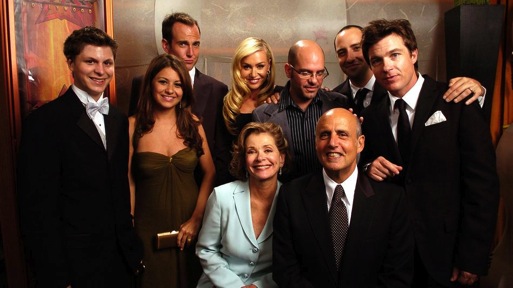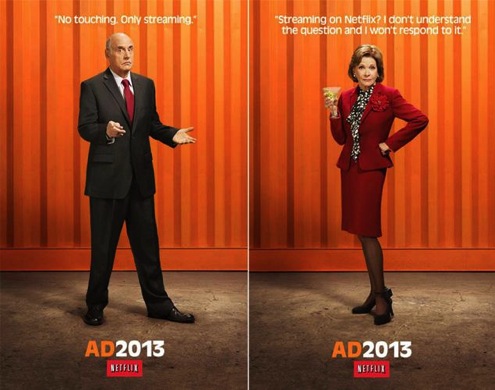Arrested Development on Netflix: a review after digesting all 15 episodes
06/04/13 12:30 PM

By ED BARK
@unclebarkycom
Eye surgery (true) and “face blindness” (false) have delayed this review of Arrested Development’s unprecedented, much-awaited rebirth on Netflix after a 2006 cancellation by Fox.
The series that initially lasted for three seasons and 53 episodes has been ready for streaming since the Sunday before Memorial Day. There are 15 commercial-free new episodes in all, with most of them running a half-hour or more. In fact, Episode 8 of Season 4 swells to 37 minutes.
So in effect, creator, executive producer and head writer Mitchell Hurwitz has given fans a full 22-episode fourth season -- and then some. That’s because a typical network comedy, minus commercials, has only about 20 minutes of actual content. Under the Netflix banner, these 15 episodes cumulatively add more than 150 minutes to the length they’d be if Fox were showing them. That’s a good deal of extra power-watching for those who’ve already powered through.
I’ve watched all 15 episodes, several of them twice. Overall impression: look for them to get better, stronger and funnier. They even start to make a little sense, if that’s possible for a series whose absurdities sometimes reach the point of almost indefensible absurdity. Oh those Bluths. In the annals of dysfunctional, devious, utterly hapless families, they simply have no peers.
One of the more “believable” absurdities is face blindness, which afflicts a pivotal new character named Marky Bark (no relation that I’m aware of). He’s a bumbling activist played by Chris Diamantopoulos (Moe in the recent Three Stooges movie). And he’s first seen in Episode 3, hooking up with Michael Bluth’s twin sister, Lindsay Funke (Portia de Rossi), at a methadone clinic that her idiot, off-and-on again husband Tobias (David Cross) has mistaken for a Method One acting school.
Marky can pretty much make out eyes and teeth but otherwise can’t tell one face from another. So he hopes that Lindsay’s hot, which she in fact still is. Their sex together is short and not all that sweet. Still, off they go to a ramshackle ostrich farm run by his cantankerous mother. Arrested Development’s tangents, now explained in even lengthier detail by narrator Ron Howard, continue to be loopier than a lasso trick. Ergo, the show has yet to achieve more than cult status in times when that’s increasingly cool.
You’ll get at least glimpses of all the Bluths in most of these 15 episodes. But the focus is on individuals, beginning with “It’s Michael’s Arrested Development” after Howard sets the table with, “Now the story of a family whose future was abruptly canceled.”
Jason Bateman’s Michael, by far the sanest of the bunch, is in another financial mess after his Sudden Valley housing development crumbles under the strains of a horrible economy, circa 2007. So he ends up moving into son George Michael’s (Michael Cera) already crowded dorm room on the University of California-Irvine campus.
For some reason Michael decides to become an online student at the University of Phoenix in an episode that also flashes back to the origins of a Cinco de Quatro celebration meant to short-circuit Cinco de Mayo. Its architects were a young Lucille and George Bluth, played in several episodes by guest stars Kristen Wiig and Seth Rogen.
First impressions aren’t everything, but it’s best to get off to a strong start with all of this heavy-breathing anticipation at stake. Arrested Development instead wobbles in the early going. And that prompted an almost instantaneous wave of negative feedback from those who just couldn’t wait to pounce.
The aforementioned Episode 3 gets things rolling, though, with de Rossi, Cross and Diamantopoulos carrying much of the load with an assist from Ed Helms returning as laissez-faire realtor James Carr. Episode 4 is stronger still, with Howard playing himself as a director intent on making a movie about the far stranger-than-fiction Bluths. All Michael has to do is get each family member to sign off. Which of course can be a near Mission: Impossible. This episode also has the biggest gaggle of guest stars, including Conan O’Brien, James Lipton, Scott Baio, Carl Weathers, John Krasinski and Andy Richter (who turns up in a number of guises in later episodes).

Howard’s crazy-quilt narratives, integral to Arrested Development, are by no means his only contributions this time around. He’s also terrific as himself, never more so than while wearing a “haircut beanie” while getting a trim during Episode 9.
Also included are the Opie Awards, with narrator Howard wondering how anything could be better than that. Maeby Funke (Alia Shawkat), now 23, gets one for Lifetime Achievement but perceives it as a sure sign that she’s already washed up. In the only Episode devoted to her (No. 12), she takes the Opie into her own hands for her own purposes. It’s the same episode in which her cousin, George Michael, dubs himself George Maharis in an effort to seem cooler while his still untested and in fact non-existent “Fake Block” privacy-protecting device begins to take off.
Four episodes earlier, new character Herbert Love (Terry Crews), emerges full force as a crooked politician who declares at a power-broking dinner, “Is there anything better than the great American scallop?!” These are the kinds of lines and situations that have made Arrested Development great.
The senior Bluths -- George and Lucille (Jeffrey Tambor, Jessica Walter) -- are also very much in evidence. Her impending trial is one of this season’s centerpieces. But will any family members actually show up on her behalf? Walter again is sublimely imperious in every scene while Tambor (also reprising his twin brother, Oscar), is entangled in ill-fated business ventures that include a sweat lodge scam and the building of a Great Wall to thwart immigration.
Then there’s Will Arnett’s even smarmier Gob Bluth, the self-absorbed, hopelessly inept illusionist whose decidedly unGod-like escape routine (in Episode 7) at the Church of the Holy Eternal Rapture might be denounced from some real-life pulpits as the ultimate in sacrilegious comedy. Later in this thoroughly out-of-body episode, Gob is part of an Entourage sendup in which all gather nightly at the “And Jeremy Piven” bar.
But what of infantile, momma’s boy Buster Bluth? Well, he gets just one showcase episode, and it’s not until No. 14. But “Off the Hook” arguably is the funniest of all, with Tony Hale fully demonstrating why no one plays a better basket case. This is also the one where Howard contributes his best narrative line after Buster dementedly takes care of a variety of mock Lucilles while she remains in a posh prison. “To an uninformed observer,” says Howard, “it looked a little like that Vince Vaughn movie, Psycho.”
This long awaited return of Arrested Development isn’t always on top of its game. There’s a tired old gay joke at Ryan Seacrest’s expense and a “registered sex offender” subplot that even the imbecilic Tobias doesn’t deserve. But Cross is so good in this role that just about anything he’s given can work on some level. He’s also adept at playing with others, particularly when collaborating on a “Fantastic Four” musical at a rehab center run by Argyle Austero (fine work by guest star Tommy Tune as the brother of Liza Minnelli’s Lucille Austero).
Season 4 of Arrested Development is supposed to lead to a climactic feature film. In that context, the final episode is left open-ended, as are all of them for that matter. The overall storyline, if it really can be called that, can be faulted for too often tying itself in knots. But seriously, what else was expected? A sense of the nonsensical has always been this show’s sixth sense. But if you watch long enough -- and then optimally watch it all again -- the pieces start fitting (Picasso-like perhaps) into a semblance of an overall big picture.
So maybe I do in fact have “Face Blindness” when it comes to Arrested Development. But as the subtitle of Episode 13 says, “It Gets Better.” And in this view it certainly does, whether it’s a disheveled Gob being found on the “Locker Hawkers” TV show or Walter’s Lucille referring to Minnelli’s “Lucille 2” as a “sterile cuckoo bird.” Oh all right, here’s the link.
GRADE: B+
Email comments or questions to: unclebarky@verizon.net
